

Scientists Detect 55 Chemicals Never Before Reported in People – 42 “Mystery Chemicals” Whose Sources Are Unknown. Scientists at University of California San Francisco have detected 109 chemicals in a study of pregnant women, including 55 chemicals never before reported in people and 42 “mystery chemicals,” whose sources and uses are unknown.
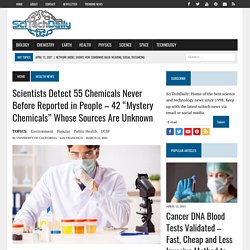
The chemicals most likely come from consumer products or other industrial sources. They were found both in the blood of pregnant women, as well as their newborn children, suggesting they are traveling through the mother’s placenta. The study was published on March 16, 2021, in Environmental Science & Technology. French court finds Monsanto guilty of poisoning farmer. (1) The secret tactics Monsanto used to protect Roundup, its star product. (1) The secret tactics Monsanto used to protect Roundup, its star product.
Miami Bans Glyphosate, Main Active Ingredient in Monsanto's Roundup. Regenerative agriculture can make farmers stewards of the land again. For years, “sustainable” has been the buzzword in conversations about agriculture.
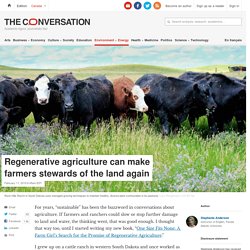
If farmers and ranchers could slow or stop further damage to land and water, the thinking went, that was good enough. I thought that way too, until I started writing my new book, “One Size Fits None: A Farm Girl’s Search for the Promise of Regenerative Agriculture.” I grew up on a cattle ranch in western South Dakota and once worked as an agricultural journalist. For me, agriculture is more than a topic – it is who I am. When I began working on my book, I thought I would be writing about sustainability as a response to the environmental damage caused by conventional agriculture – farming that is industrial and heavily reliant on oil and agrochemicals, such as pesticides and fertilizers. But there is an alternative. What holds conventional farmers back Modern American food production remains predominantly conventional.
Several generations into this system, many conventional farmers feel trapped. The future. Roundup trial: Cancer patient takes on Monsanto in first trial over weed killer risk. Doctors have said they didn't expect him to live to see this day.

But Monday marks a milestone: Johnson, 46, is the first of hundreds of cancer patients to see his case against agrochemical giant Monsanto go to trial. CNN reported last year that more than 800 patients were suing Monsanto, claiming its popular weed killer, Roundup, gave them cancer. Bayer completes $63-billion Monsanto takeover. 'It’s wrong to stink up other people’s lives': fighting the manure lagoons of North Carolina. Two poles that once hoisted a clothes line stand rusting and unused in Elsie Herring’s back garden in eastern North Carolina.
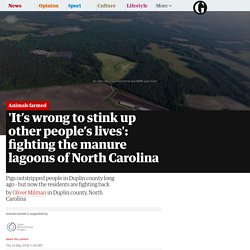
Herring lives next door to a field where pig manure is sprayed and the drifting faecal matter wasn’t kind to her drying clothes. “The clothes would stink so you’d wash them again and again until they fell apart,” said Herring, whose family has lived in Wallace since her grandfather, a freed slave, purchased land in the 1890s. “You stand outside and it feels like it’s raining but then you realise it isn’t rain. It’s animal waste. It takes your breath away. For years here in North Carolina - the second largest pork-producing state in the US - the pigs have been outstripping the humans. The pig farms of North Carolina produce around 10bn gallons of faeces a year, which is more than the volume of waste flushed down toilets by the human population of Germany. The sludge is broken down and sprayedonto nearby fields. Farmers Using Oil Wastewater. By Natasha Geiling Posted on Share this:

Four threats to global food security and what we can do about them. Can we really feed nine billion people?
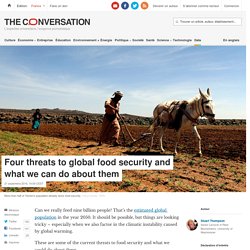
That’s the estimated global population in the year 2050. Groundwater harmed click 2x. Monsanto on Trial for Crimes against Humanity and Nature. In an announcement made at the United Nations Conference on Climate Change in Paris, Monsanto will be investigated by a citizen’s tribunal ”for crimes against nature and humanity, and ecocide.”
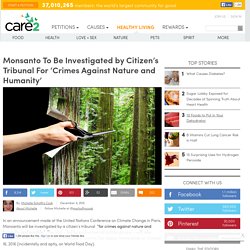
The trial — led by environmental activist groups — will take place next year at the International People’s Court in The Hague, Netherlands on October 16, 2016 (incidentally and aptly, on World Food Day). The trial is a “global citizens’ tribunal” that will include dozens of international food, agriculture and environmental justice groups, including: Millions against Monsanto, the Organic Consumers Association, Regeneration International and IFOAM Organics International—an umbrella organization of over 800 affiliated organizations in 100 countries. According to the press release issued by the Organic Consumers Association, “an international court of lawyers and judges will assess the potential criminal liability of Monsanto for damages inflicted on human health and the environment.” World Food Clock. Central Valley's growing concern: the mix of oil, water and crops.
Here in California's thirsty farm belt, where pumpjacks nod amid neat rows of crops, it's a proposition that seems to make sense: using treated oil field wastewater to irrigate crops.
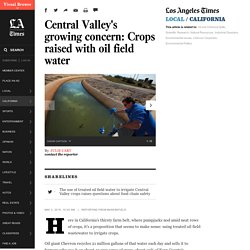
Oil giant Chevron recycles 21 million gallons of that water each day and sells it to farmers who use it on about 45,000 acres of crops, about 10% of Kern County's farmland. State and local officials praise the 2-decade-old program as a national model for coping with the region's water shortages. As California's four-year drought lingers and authorities scramble to conserve every drop, agricultural officials have said that more companies are seeking permits to begin similar programs. The heightened interest in recycling oil field wastewater has raised concern over the adequacy of safety measures in place to prevent contamination from toxic oil production chemicals. US study finds rise in human glyphosate levels. Levels of glyphosate, a controversial chemical found in herbicides, markedly increased in the bodies of a sample population over two decades, a study published Tuesday in a US medical journal said.
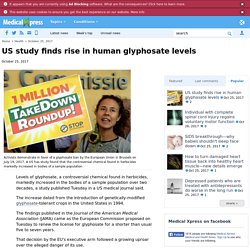
The increase dated from the introduction of genetically-modified glyphosate-tolerant crops in the United States in 1994. The findings published in the Journal of the American Medical Association (JAMA) came as the European Commission proposed on Tuesday to renew the license for glyphosate for a shorter than usual five to seven years. That decision by the EU's executive arm followed a growing uproar over the alleged danger of its use.